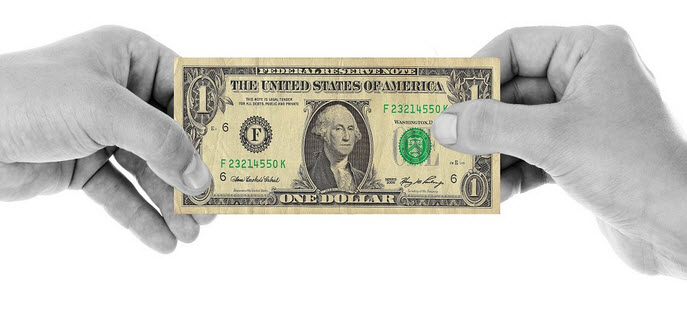
Money. It’s a medium of exchange. We use it in every transaction involving the purchase of goods and services. Our lives revolve around money. Our personal wealth is measured by how much money we have. Every day, we wake up and go to work because the majority of us needed the income from our work to sustain our daily lives. So why is the average person so afraid to learn how to manage and grow their money? Is it the fear of making mistakes? I don’t know the exact reason, but what I do know is that every mistake is a learning opportunity. Preferably, someone else makes the mistake and we learn from it. In this post, I’ll be sharing the 26 money mistakes that people make. We can all learn from it and should avoid making the same mistakes if possible.
26) Not Getting Paid When You Spend Money
Are you still using cash to pay for all your purchases? If yes, then you’re not getting rewarded when you make your purchases. There are credit cards out there that will give you at least 1% cash back on the total of your purchases without any annual fees. If you are spending money on everyday items like groceries, household bills or utility bills, you can save at least 1% by just using a credit card. Of course, the caveat is that you have to pay your bills in full and on time every month.
25) Neglecting Your Money
If you have multiple chequing accounts at multiple financial institutions or having different investment accounts at different brokerages, then you are neglecting to manage your money. By having too many accounts at different institutions, you’ll be paying more fees, you cannot manage your money efficiently and are not being rewarded for bundling your services. Cut down on the services fees by managing your money at one or two financial institutions.

24) Wasting Money With Bad Debts
With interest rates still close to the all-time low, if you are paying more than 5% per year for any loan, you are paying too much for your debt and wasting your hard earned money. Two of the common mistakes here is obtaining the wrong type of loan or not having a good enough credit history to qualify for a better rate. In the first case, it takes a little research to investigate and find the cheapest type of loans. The second case, it could take months or even years to fix a bad credit history.
23) Not Earning Enough Money
If you’re struggling to put food on the table, you’re either not making enough money or you need a better paying job or you need a second job. If you are still young and are struggling to make ends meet, it’s time to start investing in yourself to either increase your earning potential or looking for employment in a different industry with higher earning potentials. The longer you wait to invest in yourself, the more earning potential you’ll forgo.
22) Can’t Borrow Money
When a person cannot borrow money from any financial institution, there are only a few possibilities. This person either has no credit history, or really bad credit history or bankrupted or doesn’t have sufficient income or already burdened with too much debt. Regardless of what the circumstance is, it’s best to have a pristine credit history and the ability to borrow money even if one doesn’t need to borrow.

21) Don’t Know How To Stretch Your Money
The concept of stretching your money is either through getting more goods for each dollar spent or paying less for the same amount or quality of goods. People that are able to stretch their money can often find great deals through sales clearance, coupons, Groupons, Ebates, and Facebook buy and sell groups in their local area. Why pay regular price when you can pay less for your items. Check out how I stretch my money in a recent post.
20) Insecured About Money
If your money issue is keeping you up at night, it’s either you don’t know how to manage your money or taking too much risks with your money or worrying about not having enough money. These issues can be mitigated and managed with financial literacy and knowledge. The key thing is to take the initiative to improve your financial knowledge and take control of your money instead of letting it control you.

19) Fight About Money
When people have fights/arguments about money, it usually boils down to being transparent and honest about money. Regardless if it’s between spouses, family members, friends or business partners, without transparency and honesty between individuals, people will always fight about money when they encounter financial hardship. To eliminate potential quarrels over money, I’ve highlighted a few methods in my benefits of investing with a partner post to share with you.
18) Ask Your Parents For Money
Your parents had spent thousands raising you, provided you with free food and shelter for quite a few years. Once you are able to earn your own money, it’s not right to go back to your parents and ask for money. It just showed that are still immature, lacks independence and financial responsibility. Show them that you are matured and responsible. Give them a few hundred bucks once in a while to make them happy.

17) Making Money For Other People
If you are still investing in high fees mutual funds and ignoring the low-cost index funds, then you are helping other people make money instead of helping yourself. According to an article on Forbes.com, 90% of the mutual funds out there can’t beat the low-cost S&P 500 index fund. Hence, if you’re not investing in the low-cost index funds, that means 90% of the time, you are helping the fund managers make money instead of yourself.
16) Seduced By Money
Quite often, may people are seduced by the opportunity to make a quick buck in the form of a guarantee returned over a short period of time. For example, these fraudsters lured their victims by offering great returns on their investments while promising to protect their investment principles through syndicated mortgages. The general rule is: greater returns always means greater risks. There is no such thing as a guaranteed investment that provides astronomical returns.

15) Not Growing Your Money
Most people think that investing their money is very difficult or they read some recent news of how volatile the stock market is so they avoid investing their money altogether. This, in turn, led them to either keep their money in savings accounts that earn peanuts or keep their money in principle protecting investment vehicles. If you have a long-term investment horizon like 15 years plus and you are not investing in higher return investment vehicles, then your are most likely not growing your money correctly.
14) Hiding Your Money
You’ve heard of the cliche that some people hiding their money under their mattresses, but inside an old TV set? That’s something new. The Canada Deposit Insurance Corporation (CDIC) provides protection of up to $100,000 for your deposit at any financial institution, there’s no reason so hide your money under your mattresses or inside a TV set. Besides, you risk losing your money to fire, theft, robbery or forgetfulness. In addition, you even lost out on any potential interest if your money is not deposited at a financial institution.
13) Owe Your Friends Money
When your friends lend you money, it’s usually interest-free and out of goodwill and they trust that you’ll be paying them back voluntarily. It’s common courtesy to pay your friend back as soon as you have money and keep your good credit history with them. It’s the same as borrowing money from a financial institution, if you often neglect to pay back your loan, people will stop lending you money.

12) Laundering Your Money
It’s illegal. Don’t do it. If you get caught with money laundering, you’ll definitely lose more than the amount that you’re trying to launder. The governments may freeze or confiscate all your assets. Worst of all, you’ll most likely be in a jail somewhere and would not have any opportunity to spend any of your money. I am too pretty to go to jail, so I’ll definitely not make this mistake.
11) Not Protecting Your Money
Not many people put a lot of thoughts into protecting their money in the form of a will (I must admit, I am still guilty of this as I don’t have a will and I should). To prevent the government from arbitrarily distributing your money or people in your family fighting over your money after you’re gone. It’s best to have a will to clearly state who should get what in the case that you’re gone from this world. It’s also prudent to clearly explain your reasons for how you divide your assets among your family members to prevent them from fighting over your estate.

10) Missing Out On Free Money
There are free money available everywhere if you look hard enough. For example, some employers either provide stock options as benefits or through employee share ownership plans (ESOP). If you invest in the company’s stock, you’ll get a portion of your savings for free. If you invest in your Registered Retirement Savings Plan (RRSP) or your kid’s Registered Education Savings Plan (RESP), you’ll get a tax refund or a free government grant. All these are free money that’s available for people to take advantage of. See how I get a 72% return when I use just three saving vehicles: ESOP, RRSP, and RESP.
9) Don’t Know How To Manage Your Money
As I’ve mentioned at the beginning of the post, our lives revolve around money. If we need to use money all of our lives, wouldn’t it be logical for us to know how to manage our money? If we are able to learn how to manage our money at a young age, then we’ll reap the benefit for the rest of our lives. In addition, the earlier we learn to manage our money, the earlier we are in control. You would rather be in control of your money, or let the money control you?
8) Trust The Wrong People With Your Money
It’s okay to hire help to manage your money, but never give total control of your money to anyone. Think of Bernie Madoff and how many people entrusted him with their money and ended up losing a fortune because he was running a Ponzi scheme. The rule of thumb is: it’s your money, and you should take full responsibility for it. Otherwise, you are just rolling the dice and hoping for the best.

7) Not Saving Enough Money
If you are living pay cheque to pay cheque and needs to go into debt if you don’t have your pay cheque for a month or two, then you are not saving enough money. Some people believe in having a rainy day fund or emergency fund, I believe in access to funds. When you are having difficulty just to build a cushion of one or two months of expenses, you are either spending too much of your income or you’re not making enough. In the former case, you can always cut back on expenses and the ladder is to increase your current source of income or add additional sources of income.
6) Only Have One Source To Generate Money
In today’s fast-paced world where businesses are constantly adapting to the economic environment and no job is safe for life, if you only have one source of income (employment), then your financial well-being is at risk. Everyone starts with one source to generate money, but if you are not slowly increasing or diversifying your income sources, then you risk jeopardizing your financial well-being if you lose that income source. To see how you can increase your income sources, check out my saving a million dollars series post to see how I have seven income sources to help me generate passive income.
5) Spending Too Much Money
If you are spending more money than you are earning, then you are either spending too much money or spending money that you did not earn. Depending on the monthly shortfall, and the interest rates that you pay for that shortfall, it may not seem like a huge issue in the short-term. However, people will go into a long-term debt spiral if they don’t rein in their spending habits and they put all of their debts into their high-interest credit cards.

4) Showing Off Your Money
Some people get the short-term satisfaction of showing off to others that they can afford the latest gadgets, the expensive luxury cars, or the designer clothes. We in the personal finance community call these actions keeping up with the Jones and it usually destroys your wealth. On the other hand, it’s much better to live modestly and purchase income producing assets that will increase your wealth over time rather than spending foolishly on materialistic possessions that can only provide short-term satisfactions.
3) Jealous Of Other People’s Money
Do you know someone who makes a lot of money? If you do, then you are lucky in a way. Some people tend to be jealous of people when those people make more or a lot more money than them. The reason why I say that you’re lucky when you know someone who has money is that you can learn from them. Instead of being jealous of their money, you can ask them how they make their money. What better way to become a millionaire than to learn from someone who is already a millionaire?
2) Not Talk About Money
Is talking about money a taboo to you? Are you afraid to be judged because of your money? Well, have no fear. There is no need to fear what other people think of you because of the amount of assets or debts that you own. The goals for talking about money is to learn and benefit from each other’s experience. What actions will lead to greater wealth and what actions will lead to destroying wealth? If we can put aside the fear, judgment, and resentment, and concentrate on the benefits, knowledge, and literacy, everyone will be better off when they talk about money.

1) Not Teaching Your Kids About Money
Based on an article posted on Time.com about 70% of wealthy families lose their wealth by the second generation and 90% by the third generation. If you have the choice, would you pass on your financial knowledge or your wealth to your kids? My motto is to raise financially responsible kids so they can create their own wealth and pass on their knowledge to their kids. It’s better to teach them how to earn a dollar than to give them a dollar.

If you like this post, do it to Pinterest or follow me on Pinterest
My Two Cents
Money is a very powerful tool. When used intelligently and responsibly, it can help us build great wealth and provide us with the financial freedom to do what we wish. However, when it’s being used irresponsibly, it can ruin and destroy our lives. Be money smart. Take control of your money and have it working for your instead of you working for money.
How important is money to you? What money mistakes do you want to avoid?





 About Leo
About Leo
The cornerstone issue for managing household finances is (1) understanding the six activities that constitute everyone’s day-to-day finances, and (2) having a tool that is built around those six activities that allows a person to manage each activity independently while presenting a composite projection. In other words, a tool that supports horizontal planning for each activity while displaying a vertically calculated “bottom line” to track financial health. That, in a nutshell, is the Forward Focused Model of managing household finances. I’ve just started a blog on my website that will introduce these concepts in a manner that, hopefully, folks can understand. My goal is to help as many people as possible to find the financial peace of mind that Lois and I have been enjoying for the past 15 years.
@George, having a tool to manage your finance can definitely make things easier. I don’t have a model to track and manage my finances, but I do have my own personal excel spreadsheet that I’ve used for the past 9 years. It’s working very well and I am able to analyze my net worth anytime I want.
I don’t know about this latest post of yours Leo, in the sense there is a lot of interpretation to what is between the lines that folks may either not totally grasp or understand or may take these as being unimportant.
Being the older person having gone the gamut I have no advice on “money mistakes” – what I do know from my own experience as follows in no particular order…
– immediate family is first & foremost, trust no one else.
– don’t spend what you don’t have
– borrow only what you can pay back
– do not trust anyone other than yourself when it comes to your money
– always try best you can honestly to use OPM for financial gain
– learn by listening to others success that they may share with you
– educate oneself till you have reached the level of your own incompetence
– strive to work 90% smart 10% hard
– pass on any knowledge to those that ask for help
– don’t worry or think about other folks wealth or success – yours is the only one that matters
– do not loan or give friends money no matter what
@John, I really appreciate your honest and personal feedback. You make a great point that it’s personal finance and it’s personalized to each individual. The numbering system is not meant to order the mistakes, but just a count. What I view as a mistake may not be a mistake to other people but it’s a reminder that things can go wrong when managing money.
BTW – if you haven’t noticed, 26 is my favourite number, so when it comes to tips, I’ll most likely strive for 26 :).
I agree with you Leo, 26 is a very good number, can be anything you want it to be, such as 26 letters of the alphabet or the twice a year (26 weeks) of 26% net asset growth – 1% per week … I get it & like it
You are doing a fine job with your blog that provides a lot of insight & information to others
This is a bit sad but people that think they don’t need multiple revenue streams are setting themselves up for some problems down the road. The way the world is moving you have to have as many streams as possible. Interestingly enough I feel like we are moving to a society that is content driven. If you don’t create some type of content with value that you will be left behind. I am trying to continue to improve my writing skills so one day I can eek up some revenue 🙂
@MSM, from what I’ve seen, once there is any sign of trouble, organizations will start to layoff people. When there are new management taking over, they’ll be laying off people. When organizations want to cut cost or improve earnings, they’ll layoff people. Regardless of how secure you think your job is, there is a chance that you can get layoff anytime. So, to mitigate the risk of financial hardship when I get layoff, I am building my plan B, plan C and whatever plan I have to increase my income sources.
I am definally guilty of not using my credit card enough. Currently only have 27 bucks cash back. I got to step that up
@PassiveCanadianIncome, I use the Tangerine Mastercard with no annual fees. The cash back gets deposit into my saving account every bill. I love it. If you pay your bills every month in full and on time, you’ll definitely be enjoying the cash being deposit into your savings account like me.
This is a pretty interesting about money and what we can do in our lifestyle. Thank you for your sharing
@Racheal, You’re welcome. So which of the 26 did you find interesting?
Your first point on credit cards is an interesting flashpoint in the PF community. I’m with you. I have moved almost all of my spending to credit cards. If I can get cash back on everything I ever spend money on and not get stuck carrying change in my wallet, then that is a double win. I understand where people that are bad at managing cards should avoid them, but if you pay your bills every month it is a super easy win.
@Matt, my view is, if you are spending the money anyway, why not get free money back from your spending? Even if it’s just 1%, that’s still free money. In addition, if you use a credit card, it’ll help you build credit history. When you use the card responsibly, your credit score will improve. That’s a win-win situation to me.
for us personally I don’t think a no-fee CC cash back will work given the hassle of record keeping etc
Our expenses that we could charge to a CC would be basically groceries , gasoline & a fee other bits which would amount to approx $6000/yr. At 1% that’s $60.
We currently pay cash for almost everything. We have cash on hand to cover all or any purchases each month.
Utility bills & property tax we simply pay them at the bank on a once per week visit every month.
I know this seems dinosaur, but hey it works for us.
We don’t use a credit card unless it’s for a flight or a large purchase, we still use cheques – nor do we use a bank card
This is old school & comes as a result of our upbringing & the fact that we have the cash to do it.
@John, when it comes to managing your finances, you get points for responsibility and accountability. Whatever method allows you to save money or pay less interest or spending less or even remembering to pay your bills on time should be implemented. The key to achieving personal finance success is to find a method that fit’s your needs instead of following someone else’s method that does not benefit you.
14) Hiding Your Money–does having a piggy bank count? That is where I drop spare change and loose coins from my pocket everytime I arrive back home.
@Ralin, your method is saving money not hiding money as long as you take those change to the bank and deposit it in your account. Hiding money is actually putting lots money somewhere secretive not pocket changes.
Oh no… this hits so close to home, and it can be pretty hard trying to avoid these.. I am sure in our lives we have probably done one or more of these mistakes….
@Miera, we are human after all and everyone makes mistakes. As long as we learn from it and avoid making the same mistakes repeatedly, I think we’ll be fine.
Really worth reading. Thankyou!
@Iman, thanks for dropping by. Glad that you liked the post.
While I have been avoiding many of the mistakes that you have listed out, such as using a no-fee credit card, there are some that I am still currently committing, like not enough passive income stream. This is one that I am constantly looking to build. I want money to work for me and not the other way around.
@Emily, you’re right. To avoid working for money, we build more income streams and have money working for us in the long term so we don’t have to work. It takes time to build more income streams, but if we work hard, just like anything else, we’ll definitely succeed one day.
My loan is definitely overpaid. After reading this I think I should do some research and get my loan refinance to save up some money for myself.
@Jiashinlee, I find that if I put in a couple of hours to do some research on the loan that I want, I have more information when I negotiate my loan. A few hours can potentially save me a few thousand dollars. I would definitely recommend doing some research.
Great article Leo. I shared it on Stumble Upon and Twitter because I know they love list posts!!!
Cheers and have a good day.
@Erik, thanks for sharing my post. I just started to joined twitter and have yet to be on Stumble Upon yet. I really appreciate your help to share my post to reach more social media platforms.
No. 25 is so true. I was being charged a certain fees by R Bank to reactivate my bank account.
I shut it down right away. :\
@Puiyeesss, In my past experience, I find that if you don’t question the fees that your financial institution charges you, they’ll definitely continue to charge. If you don’t check your statement on a regular basis, your fees can add up pretty quickly and you can end up being charged quite a bit of fee.
“It’s illegal. Don’t do it” that is funny. I think from mothers stand point, teaching our children about money is such a huge one that so many parents miss, either because of lack of knowledge or thoughtless behavior. Great post!
Thanks for the great tips! I only recently realized the potential of rewards on credit cards. 🙂
thanks for the money tips. really love it as they are useful as well.
I need to work on being more deliberate on #26. Its a great and easy tip but it takes discipline.
This tips could actually come in handy.It’s always unwise to spend the money before earning it.
great sharing..really need this money tips as a mother of 3 now!
I haven’t asked my parents for money in MANY years, but I know if I had an emergency and needed money – they would give it to me in a heartbeat. I would look for other options first, though.
And this reminds me – I have to check in about an invoice – ha!
There were a lot of very good points in this post. One thing my parents taught me when I first started working was that every time I got paid to pay myself (put x amount into my savings). This method has worked well for me so far.
I feel so ill equipped here being so so naive about finances. I have no idea how to manage money at all and totally depend on my hubby to handle everyone regarding money. I actually get jitters when I walk inside a bank and feel a sense of achievement doing the smallest bit of banking myself. This was really interesting for me and I especially liked the concept of stretching your money and not dealing with more than two financial institutions. And yes we need to teach our kids about managing their money or it becomes really difficult in later years.
What an awesome list of tips! I really believe this kind of stuff should be taught in school, if so my life would be very different. We learn from our mistakes but financial mistakes are hard to fix.
I am definitely not earning enough money but I hope that will change soon. I like the sound of learning more about financial literacy x
Guilty as charged! I still have the bad habit of hiding some money under the mattress. I always thought I’ll need it’s for emergency. But with ATM and credit card – I guess there no need for that anymore.
I’m helping have found a lot of things that I do regarding my money are in line with this post. I’m working to increase my sources of money now.
Thank you for this! I try not to make mistakes with my money. I teach my kids about good saving habits often so they won’t make mistakes.
Great list! I myself use credit card for monthly transactions because I get rewards points. My point of view there is that, the rewards I earn can help me buy gadgets or other things. True enough, we were able to buy airline tickets for our vacation using my rewards points!
I’m glad to say I have been avoiding many of the mistakes that you have listed out! I just need to work out a passive income stream to ensure I have another source of money for many years to come.
Wow, what a great list! Thanksfully I don’t do most of these things, but there’s always room for improvement!
I think the most importantly is how you manage your financial. There’s people that earn less, but richer and there people earn more but poorer.
This is a very informative post and an important one. i agree Money saved in money earned and also believe in the power of compounding..!
I don’t like the idea of borrowing money from anyone and so I have learned how to manage my money well. I think these are really important to take note of so you won’t have to commit these mistakes in the future.
Money is too powerful these days, I try to trade in places where I can instead of using money. It makes giving things away easier as well when you can’t see a $$ amount attached to it.
Money is way to overrated now a days. Money is a huge stresser in our lives and it shouldn’t be. It’s unfortunate but it is 🙁
This is a great list! I was even guilty of one or two but for the most part we avoid a lot of those.
I recently just posted teaching kids early on about financial literacy and the importance of saving and investing. It’s really up to us parents to teach kids so they can avoid those money mistakes.
Thanks for the tips I will keep that in mind and hopefully dont make the same mistake.